Secondment in Pècs - a report by Joshua Roe
"In 1995 we got our first telephone line, in 1997 a dial-up connection, and in 1999 everyone was talking about fibre broadband internet". This was only one of many things ESR Joshua Roe learned about Hungary when he went on a 3-month secondment in Pécs. Read all about his experiences below.
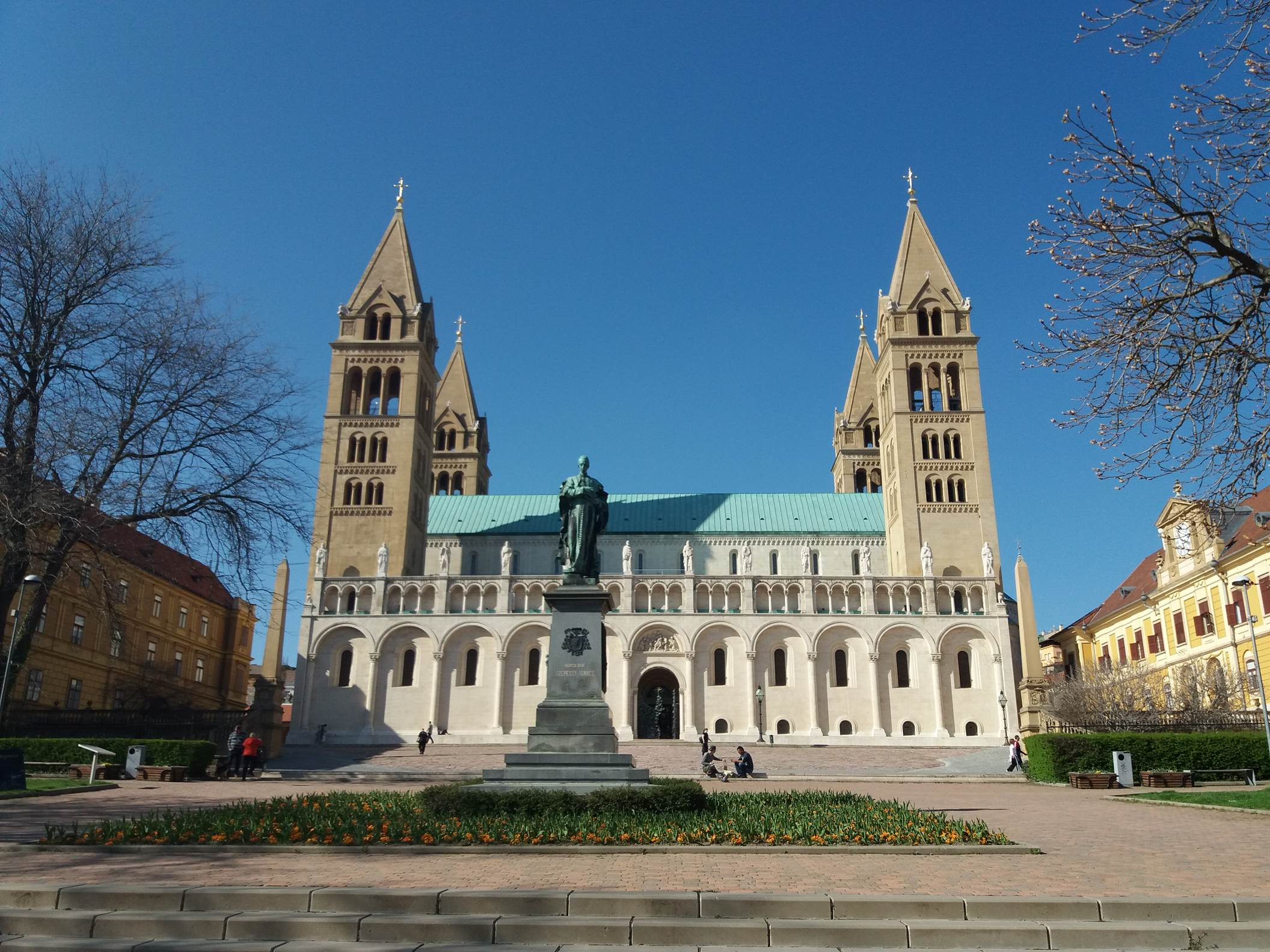
From Germany to Hungary
- my secondment in Pécs
"In 1995 we got our first telephone line, in 1997 a dial-up connection, and in 1999 everyone was talking about fibre broadband internet"
From my first conversation with a local Hungarian, this sentence stuck out. Admittedly I had little knowledge about Hungary before arriving in Pécs. My knowledge extended to not much more than the 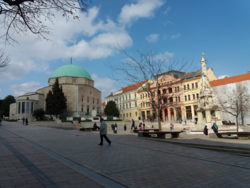 Hungarian Uprising of 1956, what I had recently read in the news (mostly about the then upcoming general election), and whatever I had learned from the strange mixture of Hungarian phrases on Duolingo. The country has undergone a rapid change since the collapse of Communism, which is clearly exemplified in technology and access to technology. Indeed almost everywhere I go credit cards are excepted without fuss (and even a little condescending that my card is not contactless), whereas in Germany, to where I've moved for this PhD, cash still dominates for most transactions and when I've made a contactless payment people have looked at me like I'm doing magic. As a city, Pécs combines modern with history; trendy coffee shops sit alongside churches and squares in a variety of architectural styles.
Hungarian Uprising of 1956, what I had recently read in the news (mostly about the then upcoming general election), and whatever I had learned from the strange mixture of Hungarian phrases on Duolingo. The country has undergone a rapid change since the collapse of Communism, which is clearly exemplified in technology and access to technology. Indeed almost everywhere I go credit cards are excepted without fuss (and even a little condescending that my card is not contactless), whereas in Germany, to where I've moved for this PhD, cash still dominates for most transactions and when I've made a contactless payment people have looked at me like I'm doing magic. As a city, Pécs combines modern with history; trendy coffee shops sit alongside churches and squares in a variety of architectural styles.
The opportunity to come to Pécs is part of the training requirement of the Marie Skłodowska-Curie 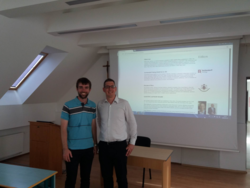 programme. All the PhD students in the project have to spend three months at a non-academic partner institution of the project. This requirement is intended to prepare researchers for work after the PhD is completed and in particular non-academic sectors, which is especially important given that only a minority of humanities students continue in an academic career pathway. Our partner in Pécs is the Christian Heritage Centre, which is part of the Catholic Diocese of Pécs. The director of the centre is György Heidl, whose own research has examined the reception of Origen, namely in Augustine. At the same time as me, Morten, my colleague in the project is also doing his internship at the Christian Heritage Centre and together we have been working in the Klimo Library, which was founded by bishop Klimo of Pécs in 1774 as the first public library in Hungary.
programme. All the PhD students in the project have to spend three months at a non-academic partner institution of the project. This requirement is intended to prepare researchers for work after the PhD is completed and in particular non-academic sectors, which is especially important given that only a minority of humanities students continue in an academic career pathway. Our partner in Pécs is the Christian Heritage Centre, which is part of the Catholic Diocese of Pécs. The director of the centre is György Heidl, whose own research has examined the reception of Origen, namely in Augustine. At the same time as me, Morten, my colleague in the project is also doing his internship at the Christian Heritage Centre and together we have been working in the Klimo Library, which was founded by bishop Klimo of Pécs in 1774 as the first public library in Hungary.
The collection of the library reflects the interests and ambitions of its founder and subsequent librarians and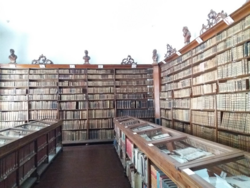 is remarkable in its variety; it even contains protestant literature and made these accessible to the public in a demonstration of this early commitment to academic freedom. Our tasks have included examining items in the collection to gather and collect data for the cataloging of these items, as well as keeping an eye out for references to Origen! Today, the library no longer functions primarily as a library but hosts exhibitions, open to the public for guided tours and for researchers who wish to access its collections. The is library is only one of the historical attractions in Pécs: the diocese also runs the Granary Visitor Centre, which has an exhibition about the suppression of the Catholic church under Hungary's Communist occupation; and in front of the cathedral lies the Early Christian Cemetery, a UNESCO world heritage site.
is remarkable in its variety; it even contains protestant literature and made these accessible to the public in a demonstration of this early commitment to academic freedom. Our tasks have included examining items in the collection to gather and collect data for the cataloging of these items, as well as keeping an eye out for references to Origen! Today, the library no longer functions primarily as a library but hosts exhibitions, open to the public for guided tours and for researchers who wish to access its collections. The is library is only one of the historical attractions in Pécs: the diocese also runs the Granary Visitor Centre, which has an exhibition about the suppression of the Catholic church under Hungary's Communist occupation; and in front of the cathedral lies the Early Christian Cemetery, a UNESCO world heritage site.
Our time in Pécs has also opened new opportunities and discourses that we would not have otherwise encountered: Morten has given a lecture on his PhD topic of the reception of Origen in Augustine to a local Catholic college and we have also learned about some unique philosophical and theological discourses that developed in Hungary and the problems they present. For example there is a project based in Budapest 'Narratives of the History of Hungarian Philosophy (1792-1947)' that has significant parallels to our own. This project also concerns reception history but in a specifically Hungarian context and focused on the question of Hungarian philosophy as an outsider discourse should be understood in relation to dominant international narratives in philosophy; similarly our project asks the question of how to understand Origen as an 'outsider' to the Augustinian tradition.
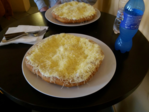 But it has not been all work, Morten and I have given up our dignity by very inelegantly trying to eat the local delicacy of lángos! (Of course, an Originean might also add that we lost our dignity by falling from our rational immaterial souls and giving in to our carnal desires but then Origen didn’t know how delicious lángos is!).
But it has not been all work, Morten and I have given up our dignity by very inelegantly trying to eat the local delicacy of lángos! (Of course, an Originean might also add that we lost our dignity by falling from our rational immaterial souls and giving in to our carnal desires but then Origen didn’t know how delicious lángos is!).
Joshua Roe